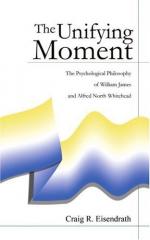|
This section contains 7,813 words (approx. 27 pages at 300 words per page) |

|
SOURCE: “A. N. Whitehead and the Philosophical Synthesis,” in The Journal of Philosophy, Vol. LII, No. 9, April 28, 1955, pp. 225-43.
In the following essay, Hintz studies Whitehead's philosophy of religion.
At the time of Whitehead's death in 1947, a contemporary American philosopher appraised Whitehead's achievement as follows: “It would be absurd to claim that he solved all philosophical problems. Yet, when one sees among the followers of Whitehead, logicians and metaphysicians, scientists and theologians, Bergsonians and intellectualists, one is compelled to admit that he stands almost unique among recent philosophers in the way in which he reconciled opposing strains in modern thought and achieved the unification without eclecticism which is the true philosophical goal.”1
In the present paper, it is my purpose to suggest the philosophical synthesis achieved by Whitehead through the interdependence of his philosophy of science, his metaphysics, and his philosophy of religion and to propose that this...
|
This section contains 7,813 words (approx. 27 pages at 300 words per page) |

|


